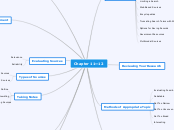Chapter 11~12

Chapter 11~12
Writing
Concluding the Paper
Building an Effective Argument
Beginning the Paper
Initiating Research
Sketching a Preliminary Outline
Analyze and Organize Points
Keeping Research on Track
Focus your investigation on building your argument
Look for at least two pieces of evidence to support each point you want to make
Right # of sources
Don't ignore info
Don't let your sources' opinions outweigh your own
Authoritative
Variety
Taking Notes
Managing and Documenting Sources
Nota Taking and Prewriting
Working With Your Outline
Types of Sources
Secondary Sources
Primary Sources
Evaluating Sources
Reliability
Relevance
Oral Argument
Presentation Aids
Multimedia
Video
Audio
Charts, Graphs, Handouts
Support
Language
Organization
Credibility
The Audience
Main topic
Organizing the Material
Ordering Material for Emphasis
Presenting the Stock Issues
Finding the Middle Ground
Refuting an Opposing View
Defending the Main Idea
Methods of Appropriate Topic
Interesting
Not Too Broad
Not Too Unconventional
Not Too Narrow
Debatable
Evaluating Possible Topics
Reviewing Your Research
Finding Sources
Multimodal Sources
Government Resources
Options for Saving Records
Truncating Search Terms with Wild Cards
Encyclopedias
Web Based Sources
Limiting a Search
Searching for More Than One Concept
Keyword or Subjects Searching
Databases
Every academic discipline has some sort of in-depth index to research in that field
To search for books, videos, or periodical publications, use the library catalog
To search for articles, use a generalized database of periodicals.

